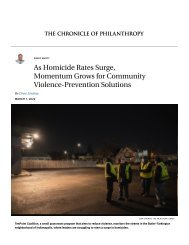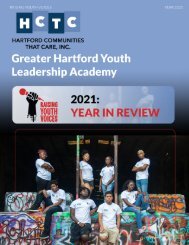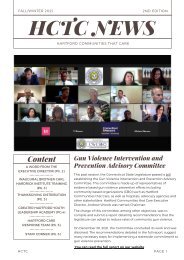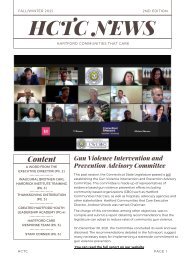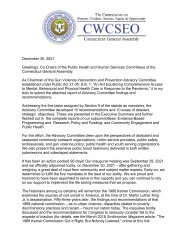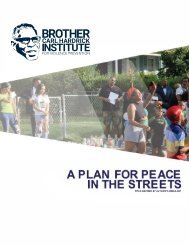HCRT Summer Report
- No tags were found...
Create successful ePaper yourself
Turn your PDF publications into a flip-book with our unique Google optimized e-Paper software.
Seasonal Staffing Report
July 1- August 30, 2020
Special thanks to vital support from
generous donors: Elizabeth Schiro and
Stephen Bayer, James and JoAnn Price,
Connecticut Health Foundation, American
Eagle Financial Credit Union and the
Hartford Foundation for Public Giving.
Introduction
The Role of the HCRT in 2020
Thanks to vital support from generous donors (Elizabeth Schiro
and Stephen Bayer, James and JoAnn Price, Connecticut Health
Foundation, the American Eagle Financial Credit Union and the
Hartford Foundation for Public Giving), Hartford Communities That
Care (HCTC) has remained focused on its mission of preventing and
reducing violence during the emergency-response recalibrations
of activity during the COVID-19 outbreak. In the work of pivoting to
coordinate critical services and implement violence interventions
backed by evidence, HCTC staff, volunteers and community partners
redesigned workloads to maintain existing services – and built new
capabilities to meet new, urgent needs. This included expanding the
services of the Hartford Crisis Response Team (HCRT), working with
local and statewide Hospital Violence Intervention Program (HVIP)
partners and hiring seasonal workers.
Since its inception in 2004, the HCRT has supported more than 1100
victims of gun violence and their families. Research has proven that
victims affected by violence are at higher risk to reengage with violence
or experience re-injury – a cycle that the HCRT frontline interveners
seek to break. These preventive efforts often begin at the hospital
bedside during the golden moment right after injury, when trained
specialists help victims make choices to support positive quality of life
and future outcomes. The HCTC partnership with Saint Francis Hospital
allows the frontline team members access to victims and families at
this most critical time, when crucial relationships can be built. Under its
current Victims of Crime Act (VOCA) grant, the Hartford Crisis Response
Team has been able to connect families with the trauma-informed
wraparound aid (health, mental health, and social services) so essential
to preventing and reducing crime in our community.
2
Services Provided
Outreach to victims, families and loved ones goes beyond the
traumatic incidents; it must be alert to the chances of re-victimization.
Case managers assist families with housing and food support; the
VOCA process for funding funeral expenses and other monetary needs;
connecting victims of crime with at-home wound care and physical
health supports through Harriott Home Health Services; and physical
healing, through a partnership under which resident physicians are
available from the Family Medical Center (a UCONN Health and Trinity
Health New England Partner). Available as needed one day per week
for home visits, these doctors reduce the burden on victims’ caregivers
to find transportation – and mitigate emergency room return visits for
uncomplicated procedures such as the removal of stiches. In addition,
services extend to mental health care, with referrals to community
partner agencies specializing in trauma-informed, culturally responsive
therapies.
Hiring Seasonal Workers
In recent months, the impact from COVID-19 has been coupled with a
spike in violence in city neighborhoods, driving up the need for trained,
frontline intervention specialists to serve an already underserved
population. Recognizing this, HCTC has found it necessary to secure
funding for seasonal – and seasoned – staff to prevent and reduce
violence among the already vulnerable population. In our search for
qualified members of the community eager to serve, we were fortunate
to find seven, well-suited individuals:
1. Brother Carl Hardrick is a mentor and leader of nearly everyone
involved in Hartford crime prevention and intervention for more
than 60 years. He has availed himself as consultant, mentor, coach,
and seasoned Intervention Specialist.
2. Daniel Palmer has known Brother Carl Hardrick and Andrew Woods
for 25 years, growing up with their mentorship in his neighborhood
and through college (he graduated from the HBCU, Florida A&M).
A personal victim of senseless violence, Mr. Palmer was in surgery
when Brother Carl and Mr. Woods met with and provided support
to his family. Subsequent HCRT services ranged from in-home
nursing and physician care to tele-therapy. Motivated by these
experiences, Daniel was glad to join the HCRT when offered the
opportunity.
3. Timothy Fraylon is a well-known Hartford resident specializing in
youth development and peacebuilding efforts in the city.
4. Darlene Childs is a life-long, civically active Hartford resident with
deep ties to the governmental and nonprofit provider community.
She served with the HCRT for several years prior to the tragic
murder of her youngest son in January 2018.
5. Quron Jackson is a 26-year-old Hartford resident with cultural ties
to local youth and young adults. He is a single father of three who
raises and supports his young children, backed by his maternal
grandmother, also active in the community.
3
6. Parishe Smith is an 18-year-old community organizer working at the
Blue Hills Civic Association. Parishe was recruited for this project
under a paid internship.
7. Johanna Schubert is a social worker and 10-year veteran of nonprofit
community work in the area. She manages communications
for the new CT-HVIP Collaborative, whose hospital, crisis response,
and legislative partners are working to strengthen HVIPs statewide.
These hires have proven to be perfectly timed. Our community has
endured a major uptick in violence since the start of the new fiscal
year, just as the uncertainties of the pandemic and widespread
unemployment have grown.
Families Affected: By the Numbers
Hartford Communities that Care data from January 1, 2020 to August
30, 2020, show that 121 victims were served by the Hartford Crisis
Response Team. Community outreach efforts include advocacy;
accompaniment to court and other case related appointments; case
management; referrals for medical care and clinical support; inclusion
in youth programs; filing for recovery of lost wages; resourcing medical
supplies; and applying for VOCA assistance. Drawing upon their
own lived experiences and the training provided by HCTC, the team
members led by Lead Interventionist Larry Johnson are present at crime
scenes and at the hospital, to provide comfort and logistical support to
families affected by violent crime. Each seasonal staff member received
two weeks of intensive training on subjects that include CPR and
First Aid; De-escalation, the history and relevance of Hospital Based
Intervention Programs (HVIPs),and working with people with Limited
English Proficiency (LEP).
Expanding and Supporting the Connecticut Hospital Violence
Intervention Program (HVIP)
HCRT is part of the national network of more than three dozen HVIPs
coordinated by the Health Alliance for Violence Intervention (The
HAVI), which provides policy and training assistance. The HAVI network
shares best practices across the U.S. and internationally, optimizing
the trauma-informed efforts of medical staff and trusted community
agencies to serve and inform victims and their families.
4
The Connecticut Hospital Violence Intervention Program (CT-HVIP)
is a collaborative of partners coordinated by Hartford Communities
That Care (HCTC) in partnership with Connecticut Children’s Medical
Hartford Area Gun and Stabbing Victims
Emergency Room Gunshot and Stabbing Data
Note: Not all gunshot victims treated in Hartford
area hospitals were shot in Hartford
2017
2018
2019
2020
Jan-Aug
Shooting/Stabbing
Connecticut Children’s Medical Center
7
4
4
10/13
Hartford Hospital
99
106
101
79/84 (Jan-June)
Saint Francis Hospital and Medical Center
109
97
98
78/48
Total Shooting and
Stabbing Victims YTD: 312
• Established in 2004, by Hartford Communities That Care, Saint Francis Hospital and the
YMCA of Greater Hartford. To date, served 1,100 fatal and non fatal violent crime victims
and families
• Partnerships: Blue Hills Civic Association, COMPASS Peacebuilders, Mothers United
Against Violence, Connecticut Children’s Medical Center, Hartford Healthcare, the YWCA
Hartford Region, the City of Hartford Rapid Response Team and various other community
and faith-based partners
• 24-7-365: Crisis Prevention, Intervention and Support Services
From July 1, 2019-June 30, 2020, served 116 unique gun shot and
stabbing victims
From April 1, 2020-June 30, 2020, served 43 unique victims/
families (Peak of COVID-19)
Since July 1, 2020-August 31, 2020, responded to serve 43 unique
gun shot and stabbing victims
5
Center, Connecticut Violence Intervention Program, Hartford Healthcare,
Saint Francis Hospital; Yale New Haven Hospital and HCTC’s Hartford
Care Response Team and others. Legislative and advocacy partners
include Congressman John Larson, State Senator Douglas McCrory,
State Representatives Matt Ritter and Jillian Gilchrest, and the numerous
community and health care partners include The HAVI. On September
17, 2020, the CT HVIP will hold its first full meeting since before the onset
of COVID-19, providing updates on how hospitals and agencies and
The HAVI have pivoted to address the pandemic crisis while maintaining
the critically important focus on violence prevention. The three CT HVIP
work groups (Research and Evaluation, Policy, and Training and Technical
Assistance) are slated to update their developments – and the entire
group will frame its goals on how to best move forward to strengthen
existing programming while supporting emerging HVIP partnerships
across the state.
Doubling Our Efforts
Violence prevention is not unique to the City of Hartford. In New Haven,
a dedicated team of frontline professionals and hospital partners also is
working to reduce incidents of crime. Executive Directors Leonard Jahad
of the Connecticut Violence Intervention Program (CVIP) in New Haven
and Andrew Woods of HCTC in a series of meetings have brought their
staffs together this summer to learn from the experiences of others –
and to support those working in frontline positions. These meetings
have included The Health Alliance for Violence Intervention (the HAVI)
national policy experts, who also are expert in training and technical
assistance for program professionals.
On August 19, 2020, HCTC hosted a Front-Line Capacity Building
Session where the HAVI presented an overview of their intensive
five-day training that can lead to the nationally recognized Violence
Prevention Professional (VPP) Certification. Twenty (20) front-line
intervention specialist representing the New Haven based-Connecticut
Violence Intervention Program and the five Community Safety
Coalition organizations: Blue Hills Civic Association, COMPASS Youth
Collaborative, Mothers United Against Violence, Wilson Gray YMCA and
Hartford Communities That Care were in attendance.
To make the most of our respective efforts in Hartford and New Haven, our
frontline workers are building a mutually supportive community, sharing
stories and best practices for violence reduction in their own communities.
6
Ways You Can Support (or continue to support) This Work
The Hartford Care Response Team served 42% of the victims of violent
crime in the city from January to August 2020. According to data from
Saint Francis, Hartford Hospital, and Connecticut Children’s Medical
Center, a total of 312 people were victims of gun shots or stab wounds
during that time period in Hartford*. 121 victims of violent crimes received
interventions from HCRT representing almost half of victims.
* Not all victims injured were hartford residents.
Victims of Violence Served by the HCRT
Year to Date 2020*
*January- August 2020 Source- Hospital records and HCTC data
312
Victims of Violent Crime in
Hartford
42%
121 Victims of Violent Crimes
Recieved HCRT Services
To continue the prevention and reduction of crime in this
heightened environment, when rates of violence are rising amidst
a 100-year pandemic, Hartford Communities that Care could use
additional assistance to:
1. Sustain at least two seasonal Intervention Specialists year-round,
with additional resources to pay a per diem rate for an “On-Call”
Intervention Specialist to be assigned to the Hartford Care Response
Team.
2. Sustain the Administrative Coordinator for the CT-HVIP Collaborative,
enabling ongoing support for workgroups and coordinated
management of the CT-HVIP Collaborative.
3. Thanks to the generosity of donors, we have been able to secure
funds to enroll between 15-20 Intervention Specialists in the 35-
hour Violence Prevention Professional (VPP) Certification program,
facilitated by the Health Alliance for Violence Intervention. This
advanced training will raise the level of care provided and will allow
for statewide continuity of intervention methods.
4. Support Harriott Home Health services in providing continuing
post-injury care to improve the recovery process. These services
support those with lack of access to adequate healthcare and lack of
insurance, a problem often reported by mostly black male victims.
Many survivors of violent puncture injuries have trouble with wound
care. Harriott Home Health Services has and continues to bridge
the gap in care for victims of violence by providing complex nursing
and wound care supplies at home. Donor support would help
7
in purchasing costly wound care supplies and prevent costly rehospitalizations
due to infections.
Andrew Woods, Executive Director
awoods@hartfordctc.org
Larry Johnson, Lead Intervention Specialist
LJohnson@hartfordctc.org
Shenell Benjamin, Lead Case Manager
SBenjamin@hartfordctc.org
Hartford Communities That Care
2550-Main Street, Hartford, Ct. 06120
www.hartfordctc.org
8






